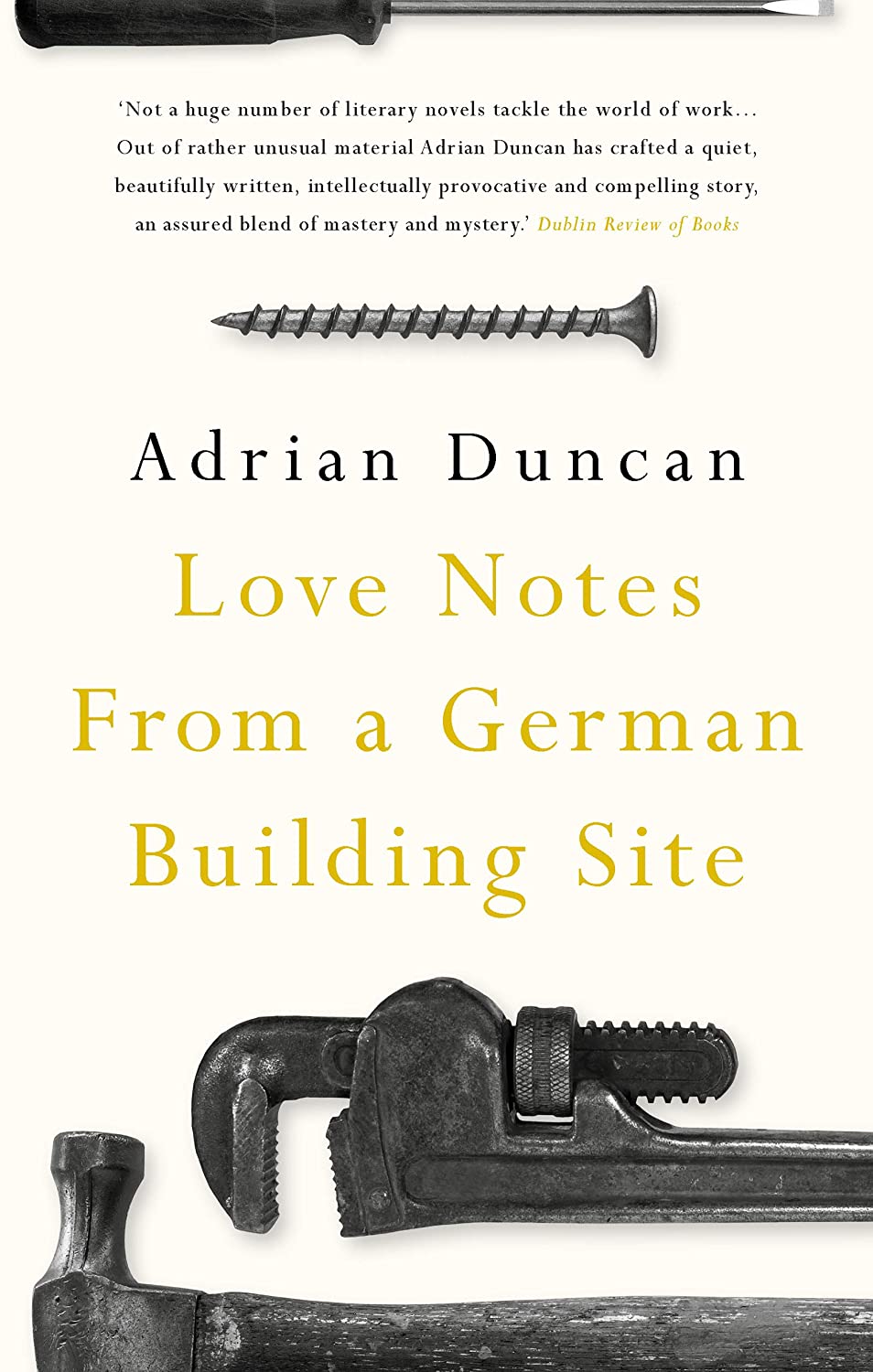Adrian Duncan‘s Love Notes from a German Building Site (Head of Zeus, 2019) tells Paul’s first-person story as he emigrates from Ireland to Germany to start afresh with his girlfriend, Evelyn. Paul is an engineer by trade, but his relationship with his job is tested and stretched by time spent on a job in Berlin—it turns out to be his last job as an engineer. Stretching over several months, the project—a conversion of a retail space—is beset by inevitable delays that end up creating a toxic atmosphere as Paul’s boss puts extra pressure on Paul to get the job over the line. The story is thus one about accelerating time.
However, in response it is a novel primarily about Slowness, and at least in that regard it has justified its victory in the inaugural John McGahern Annual Book Prize. John McGahern (1934–2006) was an Irish novelist from the west of Ireland whose novels, for the most part, depict rural life in a rapidly modernising and independent Ireland. McGahern’s novels are paeans to the rhythms of Irish life on farms and in the traditional Irish Catholic life. To describe McGahern’s novels as either Slow or slow—a distinction I’ll shortly make—is to tap into their lyrical beauty. To associate Duncan’s novel with McGahern’s can only be considered a compliment.
Slowness is, likewise, a positive attribute. In a 2017 article, Jasmine B. Ulmer described the process of ‘Writing Slow Ontology’. For Ulmer, ‘slow (with a lowercase “s”) denotes the rate at which knowledge is produced; Slow (with a capital “S”) refers to a state of being in which scholars choose to live writing and research through locality, materiality, and artisan craft’. Slow ontology thus reciprocally integrates the writer in the world, and the world in the writing. It may lead to a slowdown in terms of production and publication, but that is only a by-product.
Slow behaviours have become politicised over the last thirty years. Ulmer references the Slow Food Manifesto from 1989, and how that led to the Cittaslow Movement in 1999. The idea of Slowness has grown rapidly since, and acts in part as a response to the acceleration of modernity. The acceleration was captured brilliantly in Karl Marx’s description that ‘all that’s solid melts into air’, and lambasted by academics such as Paul Virilio in Speed and Politics (1977). Virilio coined the term ‘dromology’ as the study of accelerating speed. Ulmer (among others) makes her argument amid the backdrop of speed now afflicting writers, leading to the pressure to write and publish more.
The pressure of accelerating time afflicts Paul, especially by the end of the project:
There was so little free time over the following months that Evelyn and I barely ever got to hang out. […] My patience with the whole endeavour had crumbled, and some evenings, when it was very late and I was asked again by Gerald to stay behind, I’d take a hammer from the store room and walk to somewhere dark, forgotten and quiet in the building site and beat the fuck out of a wall.
Adrian Duncan, Love Notes from a German Building Site (London: Head of Zeus, 2019), p. 146
Paul’s abuse of the physical building, the object of his work and agent of time’s flow for Paul, demonstrates some of the Slow ontology of which Ulmer wrote. In this, Paul is fully situated within the space that surrounds him, and the building embeds itself in the novel.
Paul is much more open to a Slow existence. In a short chapter describing the joy of playing with his dog, Pearl, Paul notes that
In those idle times I spent with her everything was reduced to hapless rhythms, and the guilt of being out of work and being behind on many different bill and bank repayments fell away into unimportance. When I did not throw the ball, Pearl would stop amid the leaves and stare seriously at me. She’d stand to attention for a while, then sit, lick her lips, then lie, and in the silence that grew between us it felt as though we were occupying separate points in two altogether different universes, one where the passing of time had consequence, the other, where it had a little less.
Duncan, Love Notes from a German Building Site, pp. 124–5
These ‘idle times’ are full of joy and starkly contrast Paul’s time at the building site. Moreover, his commitment to the ‘hapless rhythms’ recollects Ulmer’s insistence on a Slow writer’s interest in ‘organic rhythms’ where ‘a Slow Ontology might become a conduit through which we write the materiality of knowledge’.[1] In more urbane terms, by privileging the lived experience of Paul’s dog ownership over the time pressures and capitalist demands of the building site, Paul is writing a Slow ontology.
Thus the content—i.e., the story—of Love Notes from a German Building Site promotes what might be called a Slow ontology. But the text also appeals because in its form it also promotes a Slow ontology. This is because, throughout the novel, there are conversations that go without direct translation, and often without even implied translation. Almost as an accompaniment, the text’s Appendix—a rarity in a novel—includes ‘what I consider the pointedly useful words I found. If you ever find yourself working on a building site in a German-speaking country, I’d say these words would be of some help’ (p. viii). Critically, the Appendix is not arranged alphabetically so it is impracticable to use as a dictionary to help explain those untranslated conversations.
The text thus slows the reader.
Furthermore, ‘While I was writing this, other ideas and items of interest came to my mind’, and these extra ‘components’ are ‘arrange[d …] in as clear and artful a way as possible’ as ‘they drift into the timescale of the narrative arc’ (pp. viii–ix). These interpolations—interruptions, additions—also waylay the reader and demand that she adopt a Slow practice.
Paul is aware that the German language—the text’s main agent of deceleration—linguistically decelerates its speakers. Thinking ‘about the order of words in German sentences’, he explains that
the active verb—the descriptive verb—was so often held breathlessly to the end. I thought how it was a strange way to speak, to counter-inform the material of the sentence in this way. When people spoke to me in German I always imagined the nouns and adverbs and adjectives lying inert across the line of the sentence until the last word, this verb, sprung them into life. I decided there was an inherent patience in listening like this.
Duncan, Love Notes from a German Building Site, p. 44
Almost fractally, the level of Slowness in the novel is visible even in the smallest intelligible units—the words—as well as across the book’s macro structure—the Prologue, Foreword, main sections, Appendix. When form and content marry in this way, it is easy to see how a book can become prize winning.
Certain phrases in the passages I have quoted give the text’s reader directives for reading: ‘idle’, ‘hapless rhythms’, ‘patience’, ‘drift[ing] into the timescale’. These directives encourage the reader to read the narrative actively—i.e., to think about the plot, character development, etc.—but also to be ‘sprung […] into life’ like the German language’s active verb. In this case, I think it’s useful to think of the text springing the reader into life just as, for Ulmer, a Slow ontology can ‘move us towards the cultures we desire’.[2]
[1] Jasmine B. Ulmer, ‘Writing Slow Ontology’, Qualitative Inquiry, 23.3 (2017), 201–11 <doi: 10.1177/1077800416643994>, 203.
[2] Ulmer, ‘Writing Slow Ontology’, 208.


Leave a Reply